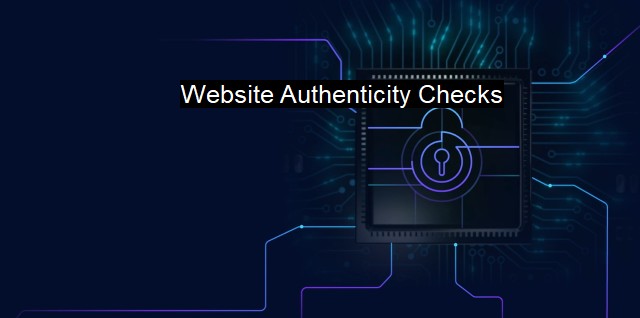What are Website Authenticity Checks?
The Importance of Website Authenticity Checks in Cybersecurity and Antivirus Protection
Website authenticity checks are considered a fundamental aspect of cybersecurity and are integral to the functionality of antivirus software. In a rapidly evolving digital landscape, where threat actors continuously devise sophisticated techniques to compromise computer systems and gain unauthorized access to sensitive information, ensuring the integrity and credibility of websites becomes increasingly critical. By definition, website authenticity checks refer to an array of methods used to confirm the legitimacy of websites and protect internet users from fraudulent activities such as phishing, identity theft, and cyberattacks.The concept behind website authenticity checks rests on the basic cybersecurity principle of trust. Trust, in this context, refers to the certainty that a user interacts with a legitimate platform and that their personal information is securely transmitted. The website certification process substantiates this trust, setting a secure communication pathway between the user's browser and the website's server, thus making website authenticity checks essential to a safe web browsing experience.
Digital certificates, also known as SSL (Secure Sockets Layer) or TLS (Transport Layer Security) certificates, represent a common method for website authenticity checks. They function as an electronic document that confirms the owning entity's credentials of a website, providing confidence for users entering personal data. An SSL certificate contains the certificate holder's name, a serial number, expiration dates, a copy of the certificate holder’s public key used for encrypting messages and digital signatures, and the digital signature of the certificate-issuing authority, ensuring that the certificate is genuine.
Website owners typically procure these certificates from trusted certification authorities (CA). When a user enters a website, the browser conducts an authenticity check by requesting the website's SSL certificate and validating its integrity with the issuing CA. If validated, the browser will depict a padlock symbol in the URL bar, reflecting that the website is secure. Any discrepancy in the SSL certificate would prompt the browser to display a warning notification, signaling the user that the website could be fraudulent or compromised.
The Domain Name Systems Security Extensions (DNSSEC) is another authenticity check method designed to protect Internet resolvers (clients) from forged DNS data, such as that created through DNS cache poisoning. It is a set of extensions to DNS, which provide to DNS clients (resolvers) origin authentication of DNS data, authenticated denial of existence, and data integrity, but not availability or confidentiality.
On the other hand, antivirus vendors incorporate website authenticity checks into the software as real-time protection mechanisms. They can proactively screen and block malicious websites based on web reputation scores, heuristic analysis, URL filtering, and frequently updated malware databases. By including these checks in their security suite, antivirus solutions provide an extra layer of security, protecting users from inadvertently accessing counterfeit websites filled with malware and other cyberthreats.
Website authenticity checks are important measures not only for users but for businesses as well. It helps businesses safeguard their reputation, prevents monetary losses from customers falling victim to scam or phishing attempts originating from perceived association with fraudulent websites. It also ensures integrity, confidentiality, and availability of data for clients and staff alike.
Although website authenticity checks significantly reduce the risk of falling prey to such cyber frauds and attacks, users need to remember that it is a preventative measure. They should complement this with safe online practices such as, carefully providing personal information only to trusted and verified platforms, adopting a reliable security suite, and regularly updating software on their devices, as hackers frequently exploit out-of-date software to carry out attacks.
Website authenticity checks, while not an exhaustive solution for cyber security, provide a strong security layer that protects against common cyber threats. With the escalating threat landscape, adopting effective website authenticity measures is more critical than ever. spreading awareness and fostering education about these checks offer the first step towards fortifying internet safety and allowing individuals and businesses to navigate the digital world with increased confidence and security.

Website Authenticity Checks FAQs
What are website authenticity checks?
Website authenticity checks are methods used to verify if a website is legitimate or not. These checks are used to ensure that the website is not fake and does not contain any malicious content.Why are website authenticity checks important for cybersecurity?
Website authenticity checks are important for cybersecurity as they help prevent users from accessing fake websites that may contain malware, viruses, or phishing attacks. These checks help users stay safe online and protect their personal information from being stolen.What are some common methods for performing website authenticity checks?
Some common methods for performing website authenticity checks include checking the website's URL, looking for security indicators such as SSL/TLS certificates, and checking for trust seals from trusted organizations. Other methods include using antivirus software or browser extensions that can detect potentially harmful websites.What should I do if a website fails an authenticity check?
If a website fails an authenticity check, it is recommended that you do not proceed with accessing the website. Instead, you should report the website as suspicious to your organization's IT department or to a cybersecurity authority. You can also use antivirus software or browser extensions to block access to potentially harmful websites.| | A | | | B | | | C | | | D | | | E | | | F | | | G | | | H | | | I | | | J | | | K | | | L | | | M | |
| | N | | | O | | | P | | | Q | | | R | | | S | | | T | | | U | | | V | | | W | | | X | | | Y | | | Z | |
| | 1 | | | 2 | | | 3 | | | 4 | | | 7 | | | 8 | | |||||||